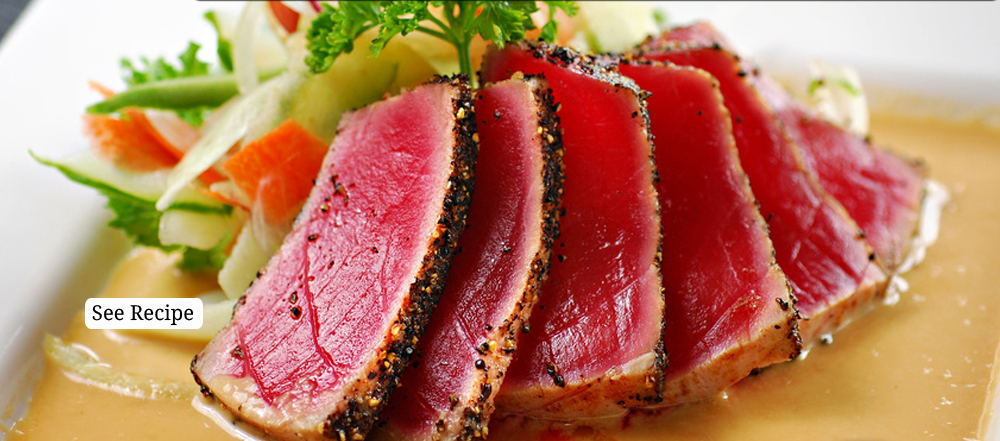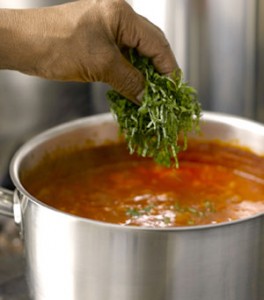Questions by: The Saucy Dipper
Chef Chuck Kerber speaks out on sauces…
Q: A little about you. What’s your background?
A: I’m a graduate of The Pennsylvania Institute of Culinary Arts, and hold a Bachelor of Science in Human Resources Management. I’ve cooked at various hotels, restaurants, and other private establishments during my 20-plus years in the culinary arts. Currently, I am an Executive Corporate Chef in downtown Pittsburgh, and the owner and Executive Chef of Chaz Catering LLC (chazcatering.com) I also provide personalized nutritional coaching, and maintain my national cooking website, (www.cooksandeats.com).
Q: Stock reductions are the foundation to many traditional sauces, but most of us won’t take the time to make our own stock at home. What do you suggest for us novice (and lazy) sauce makers do as an alternative to making stock?
A: If you absolutely can’t make your own stock, use Minor’s Soup bases. In my experience, they have the most authentic flavor, with fewer additives and preservatives than other brands. Minor’s have just about any type of base that you might need: lobster, veggie, crab, chicken, demi-glace, beef, seafood, etc. Some supermarkets carry this brand, but you may have to go to a specialty store to pick them up. Look for them in the refrigerated section.
Q: On your blog, you recommend an immersion blender to make gravy, sauce, and soup. What’s one of your favorite sauces you’ve made using your immersion blender?
A: Béchamel sauce, no question. I sauté leeks or sweet onions in unsalted butter, add plenty of salt and pepper, then some flour. Cook this mixture for several minutes, stirring constantly, add heavy cream and milk. After the cream/milk mixture simmers for about ten minutes, I drop in my immersion blender, add some fresh-grated nutmeg, and blend away. A few pats of butter added during blending enhances the taste and creates a beautiful glossy finish. The result is a rich, creamy sauce that can be the beginning of many different types of sauces, or used by itself.
Q: Can you explain what it means to have a sauce “break”? And how do you fix it?
A: A “break” occurs when your emulsion separates. An emulsion is simply the combination of oil and water; two liquids that usually don’t go together. If your sauce breaks, you can try adding some hot water and re-blend vigorously. Another possible solution: add some softened butter to the sauce as you whisk. In my opinion, the best thing to do if your sauce breaks is start over!
Q: In an effort to save our pennies and to be responsible consumers, many of us avoid wasting food at all costs. You talk about saving leftovers for the sole purpose of creating sauce. What are two or three tips you could share on this topic?
A: When I’m peeling carrots, onions, or celery, I always save the scraps. These pieces can be used as a Mirepoix. Mirepoix is a combination of chopped carrots, celery and onions used to add flavor and aroma to stocks, sauces, soups and other foods. Sauté these vegetables in butter or olive oil, then reserve them for a sauce or soup. If I’m running a shrimp special, I’ll save the shells to make a shrimp stock. If I’m butchering fish, beef or chicken, I never throw away anything- these bones and pieces can be used to make fish stock, demi-glace, chicken stock, or beef stock. Try freezing these homemade stocks in proportioned amounts (so that you don’t have to thaw the entire batch), then use them as needed in the future.
Q: What store-bought sauce do you detest the most?
A: I can’t think of a particular store-bought sauce that I dislike – I simply don’t use them. Anything with chemicals, stabilizers, and unnatural additives don’t find their way into my kitchen.
Q: I plan to make a sauce from each of the five sauce categories in the next few months. What tools do I need? (Could be a simple skillet or something more complicated that I’ll most likely need to invest in.)
A: First, buy a good stainless steel sauce pan and mixing bowl. Never use aluminum! Aluminum often distorts the true taste of the sauce, and can leave your creation tasting metallic. Buy a few good, heavy stainless steel whisks (no rubber). A good whisk effectively emulsifies the sauce, combining fat, oil and water. Also, purchase a few wooden spoons. Never use a metal spoon in a sauce pan. These are the keys to being successful when making your sauces.
Q: When you are cooking for yourself, what is the one sauce you enjoy the most?
A: I like making a simple, fresh tomato sauce. There’s nothing better than a few vine-ripened, de-skinned and de-seeded tomatoes with fresh garlic and a spicy olive oil. It goes with just about everything, not just pasta. I plant tomatoes in my yard every year so that I can enjoy this sauce!
Q: Many bloggers and sauce lovers recommend James Peterson’s book “Sauces” and Raymond Sokolov’s book “The Saucier’s Apprentice” as resources. What other books or resources would you recommend?
A: My favorite cookbook is The French Laundry Cookbook, by Thomas Keller. This book is instructive, but reads like a novel. I admire Thomas Keller as a Chef, and believe in a lot of the cooking philosophies that he puts into practice in his restaurants. If you haven’t read this book, it’s a must-have.
Q: Aside from what we talked about here, what one piece of advice you would offer to a novice sauce maker?
A: Cook every day. The only way to master your craft is to continually practice. Don’t be frustrated by set-backs – failure promotes growth. Have fun with this process. Try new things; add herbs, flavored salts, and different kinds of vegetables to your sauces and soups. Nothing is off-limits!







 in <b>/var/www/vhosts/cooksandeats.com/httpdocs/wp-content/themes/CooksandEats/sidebar.php</b> on line <b>1</b><br />
/wp-content/themes/CooksandEats/images/side-logo.png)



 in <b>/var/www/vhosts/cooksandeats.com/httpdocs/wp-content/themes/CooksandEats/footer.php</b> on line <b>13</b><br />
/wp-content/themes/CooksandEats/images/back-to-top.png)
Your bechamel sauce technique sounds marvelous. Nobody ever talks about adding onions or leeks. Thank you.
Where can I buy minors soup base in Pittsburgh? I live in Cranberry twp and I
have looked at most stores near me and no one has it. Any suggestions?
Thanks.
Restaurant Depot in the strip has them…right off 32nd street.